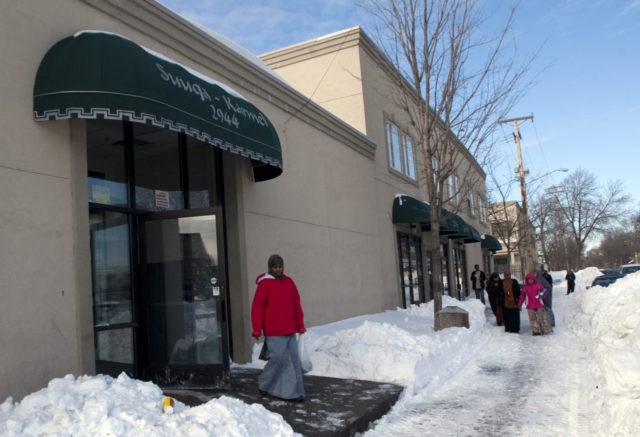“Public housing residents in Minneapolis will no longer need to pay their normal monthly rent when travel abroad erases their income, a change particularly sought by East African immigrants,” the Star Tribune reports:
The board of the Minneapolis Public Housing Authority approved this week reverting to its previous policy of collecting only minimal rent during extended absences. The change takes effect once approved by federal housing officials, which is expected by year’s end.
Abdi Warsame, a City Council member, told the board that the policy in place for the past five years works a particular hardship on elderly East Africans who must save for long periods if they want to visit their homelands. He said that many receive federal Supplemental Security Income, which is halted when the recipient is outside the United States.
Yet the policy required people to keep paying rent, which is income-based. Travelers gone for 30 to 90 days could apply for a hardship, which meant that they paid the minimum $75 monthly rent during their absence, but were required to make up the difference between that and their normal rent over the next year or two.
The change will mean that residents will pay only the $75 minimum per month, assuming they apply for the hardship status.
A number of Somali refugees living in Minneapolis Public Housing Authority apartments paid for by the taxpayers apparently take such extended overseas trips regularly.
“From 50 to 75 public housing residents report such absences annually, according to Mary Boler, an agency manager. She said the cost of the change will be less than $50,000. The agency found that the paperwork burden of tracking repayment was higher than anticipated,” the Star Tribune notes.
According to his website, City Council member Abdi Wasame “is a Somali-American and a practicing Muslim.”
Abdi Warsame was born in Somalia and grew up in the United Kingdom of Great Britain where he studied and attained a BSc in Business and a Masters Degree in International Business. He moved to Minneapolis in 2006, shortly landing a job in the financial sector.
Mr. Warsame was the founder and spokesperson for the Citizen’s Committee for Fair Redistricting, which took part in the redistricting process that aimed to create a more equitable and representative political map of Minneapolis, with the intent to create better opportunities for all residents of the City. The Citizen’s Committee lobbying was a historic success and today’s current map of the City including Wards 6 and 9 are a testament to their hard work.
After emerging as a strong voice in the community, Warsame was urged by friends and neighbors to run for public office. With their support, Warsame was elected to the Minneapolis City Council in November 2013. In winning the seat, Warsame became the first Somali-American elected to the council and the first in the nation to win a municipal election.
Warsame offered a justification for the change in policy.
“This was brought up to us again and again and again in every building we visited in our ward. Everybody was afraid to leave the country,” Warsame told the Star Tribune:
He said common reasons for travel abroad include visiting families left behind or participating in the hajj, the pilgrimage to Mecca that Muslims are expected to make at least once.
The agency allows a maximum absence of 90 days, after which it takes steps to terminate a lease. With a long waiting list, “That’s a long time for the asset to be kept empty,” Boler said.
The agency board now has two members of Somali descent, Mohamud Tamir and Abdullahi Isse. The agency’s resident advisory board also backed the change in rent policy for extended absences.
Minnesota has the largest Somali-American community in the United States, as Breitbart News reported previously:
Ninety-seven thousand three hundred and eighty-five Somali refugees have been resettled in the United States in the fifteen years since FY 2002, of which 15,710 were resettled in Minnesota, more than any other state in the country, according to the Department of State’s interactive website.
Trailing Minnesota in the top ten states for Somali refugee resettlement since FY 2002 are Ohio (7,551), Texas (7,195), New York (6,169), Arizona (5,682), Georgia (4,113), California (3,731), Missouri (3,246), Massachusetts (3,156), and Tennessee (2,958).
Minnesota also leads the country in the number of Somali refugees resettled over these fifteen years on a per capita basis, with 286.2 Somali refugees resettled per 100,000 residents of the state. (The state’s 2015 population was 5.5 million).
Only two states come close to Minnesota’s per capita Somali refugee resettlement number: North Dakota and Maine.
North Dakota experienced a 131.7 Somali refugee resettlement rate per 100,000 residents (997 refugees over fifteen years in a state with a 2015 population of 756,927).
Maine experienced a 117.9 Somali refugee resettlement rate per 100,000 residents (1,568 refugees over fifteen years in a state with a 2015 population of 1.3 million).
“Minnesota has the nation’s largest Somali community, with census numbers placing the population at about 57,000,” the Associated Press reported.
Critics of the federal refugee resettlement program see this latest news as just another example of how poorly the program is serving the country.
“Virtually all Somalis who live in the US came here (we are told) as poor refugees,” Ann Corcoran of Refugee Resettlement Watch writes.
“So how persecuted and fearful of returning home are they if many travel back and forth to Africa and the taxpayers of Minneapolis cover most of their rent while they are gone,” Corcoran asks, a question Minnesota voters may have on their mind in November.

COMMENTS
Please let us know if you're having issues with commenting.